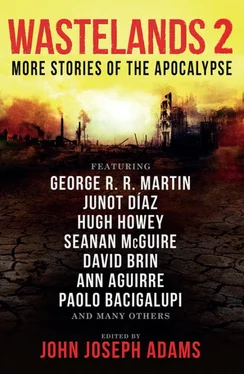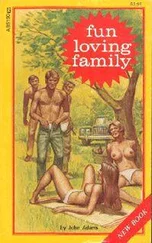“Good evening,” he said, in a rich baritone. “Sorry to leave you standing out here, but I’m inclined to be careful these days.”
He was a half-foot taller than I, with lean, almost cruel features, and dark intelligent eyes. His buckskin jacket covered a white denim shirt. His black trousers were creased. He was a dark and somber man, and his manner suggested he was accustomed to command. He wore a neatly trimmed beard, and his hair was black and quite thick.
“Thank you,” I said, moving past him. It was good to be in out of the wind.
More lights went on. The interior was quite long, perhaps two hundred feet, although it was only as wide as an ordinary room. It was decorated with Indian art, totems, weavings, pottery, and a few oils depicting teepees by sunset and young braves in canoes. Chairs were scattered about in no particular order, and with no effort to match their styles. There were rattans, fabric of a half-dozen different colors, a wooden bench, and several small tables.
He extended a hand. “This is not a good day to be on the road.”
“No,” I said. “It’s downright brisk out there.” I shook the snow off my shoulders. “I’m Jeff Quincey.”
“Edward Marsh. Where are you headed, Quincey?” His voice changed texture, not precisely softening, but rather growing consciously more amiable.
“I’m bound for the Forks. I’d expected to spend the night in Sandywater, but I got off to a late start this morning. And the weather—”
He nodded. Snow whipped across the glass. “You’ll want to stay the night with us, of course.”
“If it’s no trouble, I’d be grateful.”
“None at all. We don’t get many visitors here.” He turned on his heel and led the way to the staircase.
On the second floor, carpeted corridors ran off in three directions. The carpet was frayed and, in some places, threadbare. Closed doors marched uniformly along the walls. “This way,” Marsh said, striding off into the right-hand passageway. “What business are you in, Quincey?”
“I’m a trader. And an occasional agent for Overland.”
He nodded. “It’s the traders that’ll open up this country.” Halfway down the hall, the place began to look lived-in. The gray walls gave way to dark-stained paneling, rugs were thrown over the weary carpet, and someone had hung a series of prints. The prints alternated between abstracts and sketches of Old World city scenes. One depicted Chicago, crowded with traffic; another, New York at night; and a third, a Parisian sidewalk café. “I’ve been there,” I told him.
“Where?”
“Chicago.”
“Really?” He glanced at the image. “Odd, all the times I’ve walked by this, and I don’t think I ever really looked at it.” He pushed his hands deep into his jacket pockets. “Why?”
Why indeed? It had been one of the more oppressive experiences of my life, wandering through those gray, cold canyons. Climbing past the rusting metal that filled its ravine streets, looking up at thousands of empty windows, and knowing what lay mouldering behind them. “I was hired to help with a survey. An historical project.”
He nodded. “I do believe you’re a man after my own heart, Quincey.” We entered a sitting room half-lit by a low fire. Several pieces of oversized upholstered furniture filled most of the available space. Crossbows and bison trophies were mounted in strategic locations, and a battered garrison hat hung on a peg. Yellowing books were stacked on wall-shelves, more than I’d seen in one place this side of Port Remote. Some appeared to be military histories. But there were also travel journals, and technical titles whose meaning escaped me, like An Orderly Approach to Chaos , and The n-Particle . That was old stuff, pre-Crash, and I wondered whether anyone now living really understood them.
He switched on an electric lamp, and motioned me to a chair. “I stay out of the cities,” he said. “I don’t like places where you can’t see what’s coming at you. Anyway,” he winked, “you never know when some of the concrete is going to let go.” He took glasses and a decanter from a cabinet. “Port?”
“Yes. Fine.”
“Good. We don’t have much of a selection.” He filled them and held one out for me. “To the outside world,” he said.
That was a strange toast. I glanced through the window at the endless plain. “Cheers,” I said.
We talked for a few moments of inconsequentials. How short the summer had been this year; the apparent withdrawal of the raiders who had harassed stages and attacked settlements in the area (“too cold for them here in winter,” offered Marsh); the rumor that a firearms manufacturing plant had been set up in Nevada, and was now turning out weapons and ammunition in quantity. We refilled the glasses. My host was friendly enough, God knew, and solicitous for my welfare. But I sensed a barrier, and a lack of warmth in his smile. “You’re in time for dinner,” he said at last. “We’ll eat shortly.” He studied me thoughtfully. “If you like, I believe we can replenish your wardrobe.”
Marsh enjoyed his role as host, but I sensed he would have been uncomfortable in my position, as suppliant. “Thank you,” I said. “You’re very kind.” And I thought of Max. “I’d like to take some water out to my horse.”
“Is he in the barn?”
“Yes.”
“I’ll take care of it. Meantime, if you’re ready, let’s look at your quarters.”
* * *
He provided me with a spacious and, by prairie standards, luxurious room on the third floor. A big double bed stood in its center, with pillows piled high and a quilt thrown over. I lacked a fireplace, but there was a steady flow of warm air from a vent. The atmosphere was masculine: varnished walls, a mounted deer’s head, an antique pistol over the bed, and a military ensign bearing rifles and bugles and the numeral IV by the door. A small desk had been placed near the window. An ancient dictionary lay on the desk, and a battered copy of Pierce’s Travels Through the Dakotas on a side table.
I threw off my clothes, leaving them in a pile on the floor, and retreated into a tan-tiled bathroom. I showered in glorious hot water, toweled off, and tried the garments my host had provided. They were a size large, but they were clean and smelled faintly of pine. I washed my own clothes and hung them to dry.
The smell of steak and potatoes drifted up from the kitchen. I wandered downstairs, pausing to look through a window at the rooftop lights. They blazed through the rushing snow. What a prodigious waste of power it all was. I wondered how they were able to manage it?
Marsh must have heard me coming: he was waiting when I arrived on the second floor. “I hope you feel better, Quincey,” he said.
I did. Very much so.
We returned to the room in which we had talked earlier. A pot of coffee was waiting. He poured, and we sat down by the fire. We were barely settled when he looked up, past my shoulder. “Eleanor,” he said, “this is Mr. Quincey.”
I rose and turned, and was astonished. So, I might add, was Eleanor.
“ Jeff ,” she said, and I watched dismay, relief, fear, affection, and everything between, ripple across her face.
And I : my God, it was Ellie Randall .
For those few seconds, I could only stare.
Probably, no one ever quite recovers from the first big passion. Ellie had been mine. We’d had three months together when we were both growing up in the Forks. And that was all there was. She lost interest and walked out of my life. I didn’t even have the consolation of losing her to someone else. Shortly after that I left the area, and when I went back ten years later she was gone and nobody knew where.
Читать дальше












